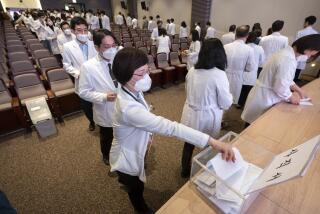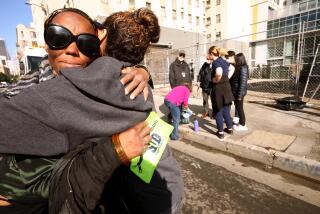Doctor Is Last Hope for the Poor
- Share via
HANGZHOU, China — A construction worker, his leg smashed in a bulldozer accident, sat all night outside a city hospital here, afraid to go in. A doctor told him to bring $600 cash -- more than he earns in a year -- and prepare for an amputation. His buddies wheeled him away on a flatbed tricycle.
They took him to see Zhao Huaqiong, a 58-year-old retired doctor who fashions her life on Mother Teresa and Albert Schweitzer. The move speaks volumes about the state of the Chinese healthcare system.
A generation ago this would not have been a big deal. Back then, so-called barefoot doctors and their small box of simple medicines were a symbol of China’s universal healthcare. The system, according to the nation’s prominent medical journals, reduced infant mortality rates, raised life expectancies and wiped out many infectious diseases.
But two decades of economic overhaul have turned the pride of communist China on its head. Half the population cannot afford to see a doctor, and the vast majority of Chinese have no health insurance.
As a result, most Chinese treat themselves with over-the-counter medicines. Some fall ill and die.
“Everybody I know is afraid to get sick,” said Jin Caixian, a 20-year-old supermarket checkout clerk who works 15-hour shifts, as she waited to see Zhao to receive treatment for a debilitating migraine. “If I go to a big hospital, I might have to pay $25 or more just to get looked at. I make less than $100 in a month. Here I pay only $6 for everything.”
International health officials fear a health crisis in the world’s most populous nation could have a catalytic effect on the spread of diseases, such as severe acute respiratory syndrome and avian flu.
The collapse of China’s healthcare safety net has increased the country’s growing wealth gap, prompting Beijing to call for reforms and more government investment in low-cost care. But health experts warn that real change takes time.
“If you can’t afford to see a doctor when you get sick, your life has no safeguards. The consequences for that are grave,” said Yang Fengchun, a public policy professor at Peking University.
For those with nowhere else to turn, the clinic run by Zhao is a life raft. On the outskirts of this prosperous coastal city’s poorest neighborhood, this one-of-a-kind private hospital opens a window into the silent sufferings of a vast underclass that powers China’s red-hot economy.
“About 90% of patients who come here are poor migrant workers,” said Zhao, a tiny woman with a raspy but forceful voice. “Most of them have only $12 in their pockets.... To go to a regular hospital you need at least 10 times that. Here, I don’t care if they have 25 cents or nothing at all. I will help them and give them the respect they deserve.”
As she speaks, a 53-year-old farmer walks in with muddied boots and a nasty toothache. She immediately hands him painkillers.
“My whole family comes here, my wife, my father,” said Cui Shengyi, barely able to speak through his pain. “She’s great.”
Like a mother to a sick child, Zhao puts the pill on his tongue and helps him wash it down with a cup of water. She tells him to come back after the swelling goes down. He gives her the equivalent of 50 cents. The pills cost five times that. Zhao often accepts just pennies. Sometimes, eggs.
Raised by physician parents who were devout Christians, Zhao was taught from a young age that medicine was a sacred art that should be used to serve the poor. She became a barefoot doctor at 18, walking house to house in a remote mountain village spread out over more than 100 square miles. Her main responsibility was delivering babies. Her medical supplies consisted of a clamp, a pair of scissors and some simple antibiotics. She spent most of her $3-a-month salary replenishing the medicines she gave away. When her mother sent her soda crackers to ease her stomach ulcer, she gave them to children who had never seen snacks.
Zhao later worked as a doctor in a state-owned factory for most of her career and, briefly, for a pharmaceutical company. Four years ago, frustrated over the inflated cost of medicines, she opened a tiny storefront clinic, which in two years grew into a small hospital with 23 doctors and 14 nurses. Staff members receive a fixed salary. No commissions from drug companies, or anyone else, are allowed. The unwritten motto is: Charge as little as possible and, if necessary, give it away.
To fund her hospital and pay her staff, Zhao took out a loan and sold her son’s apartment. She now has to sell her own apartment to keep the hospital afloat.
“She is truly unusual,” said Guo Xingzheng, 56, a fellow doctor working the night shift. “Some medicines cost $1.25 and she tells me to sell it for $1. I tell her it doesn’t even cover our cost, but she doesn’t care.”
Zhao starts work at 7 a.m. and often continues until well past midnight. She is on call every day except for a few hours a week when she attends church. She takes no salary and often sends patients away with spending money. Few return. Zhao suspects it’s because they fear she might charge them more after they’ve healed.
The few who do return sometimes unwittingly get her into trouble. An old beggar bitten by a stray dog came back to thank his doctor by setting off firecrackers outside her clinic. The lavish display of appreciation drew the attention of health officials, who fined her for giving a rabies shot without a license.
The patients drift in and out, in one-act dramas she remembers only by their big details.
One snowy day, a 60-year-old street sweeper crawled in on his knees. His lower legs were so swollen he could barely stand. By his side was a 15-year-old girl he had raised since her mother died, when she was 3. He could no longer work, he told her. He begged Zhao to help him sell the teenager so she might have a better life.
“I was so sad, I told him, ‘I will treat you for free, but you cannot sell your daughter,’ ” Zhao recalled.
After taking care of his legs, Zhao cooked dinner for the man and his daughter and sent them off loaded with leftovers. As they shuffled away in the snow for their 2 a.m. shift cleaning streets, Zhao said, she ran up to them and stuffed an additional $25 in the man’s pocket.
What frustrates Zhao the most is that she does not have the blessing of the local government.
On the contrary, she has been sanctioned for infractions, including the unlicensed rabies shot and not having a pediatrician on site.
Zhao has accepted the fines and made changes. What she can’t change, she said, is her inability to say no.
“The only thing that motivates me is that I know I am doing the right thing,” said Zhao, fighting back tears.
“I can’t change China or the system. All I can do is my part -- to treat as many patients as possible and charge them as little as possible.”
More to Read
Sign up for Essential California
The most important California stories and recommendations in your inbox every morning.
You may occasionally receive promotional content from the Los Angeles Times.










